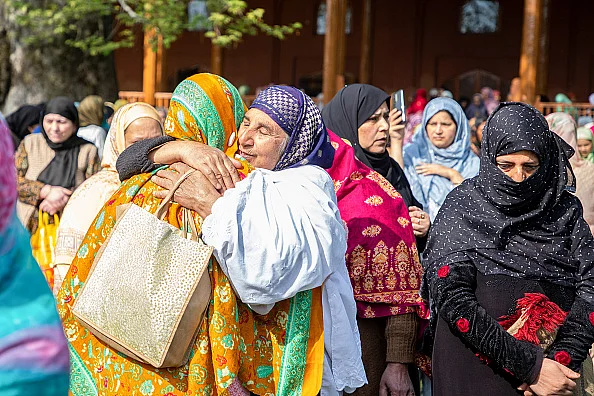The Supreme Court last week ruled that a Muslim woman can seek maintenance from her husband under Section 125 of the Code of Criminal Procedure, 1973, and said that the provision applied to all married women irrespective of their religion. The judgement came full circle decades after the landmark Shah Bano case verdict, reaffirming the top court’s stand on alimony to Muslim women.
A Muslim Woman's Right To Maintenance: From Shah Bano Case To Now
The debate on Muslim women's right to maintenance has been highly controversial for decades due to the opposing provision for the same under personal law and CrPC.

The case pertained to an appeal filed by Mohd Abdul Samad, the husband of a woman in Telangana. He had challenged an order of the Telangana High Court affirming the family court order to pay his estranged wife maintenance. However, the top court in its 99-page verdict said that in case of an illegal divorce – such as triple Talaq – as per the provisions of the Muslim Women (Protection of Rights on Marriage) Act, 2019, the woman can seek subsistence allowance from her husband.
"If Muslim women are married and divorced under Muslim law, then Section 125 of the CrPC, as well as the provisions of the 1986 Act (the Muslim Women (Protection of Rights on Divorce) Act), are applicable. The option lies with the Muslim divorced women to seek remedy under either of the two laws or both laws. This is because the 1986 Act is not in derogation of Section 125 of the CrPC but in addition to the said provision," a bench of justices BV Nagarathna and Augustine George Masih said.
Where it started
Before the controversy over the Shah Bano case started, back in 1980, the Supreme Court in Justice V R Krishnaiyer in Fuzlunbi v K Khader Vali and Another, had categorically observed that Section 125 of CrPC enforces maintenance as a secular obligation to protect destitute women, who are victims of neglect during marriage and after divorce, derived from the state’s responsibility towards social welfare. It “is not confined to members of one religion or region, but the whole community of womanhood”, the ruling said.
It was an important step towards the equal rights of women, regardless of religion.
Shah Bano verdict, 1985
The Mohd Ahmad Khan vs Shah Bano Begum & Ors. of 1985 is often seen as a legal milestone that took a definitive course in protecting the rights of Muslim women. The contentious issue of Muslim women getting maintenance under the secular provision of section 125 of CrPC was at the centre of political discourse that year when a Constitution bench, in a unanimous decision, had ruled that Muslim women were also entitled to maintenance.
The case started in 1978 when a 62-year-old Muslim woman, Shah Bano, filed a petition in court demanding maintenance from her husband Mohd Ahmad Khan, a renowned lawyer in Indore, Madhya Pradesh, who had granted her irrevocable talaq. The two were married in 1932 and had five children. After the divorce, she approached the court to claim maintenance for herself and her five children under Section 123 of the CrPC. Khan contested this under the Muslim personal law which obliges the man to pay maintenance only until the ‘iddat’ period of three months.
Iddat is the waiting period a Muslim woman must observe after the death of her husband or in case of divorce before she can marry another man.
The verdict, in favour of Bano, had resulted in controversy because it put the obligation on a Muslim man to pay maintenance to his ‘divorced’ wife, even beyond this period. In an attempt to contain the furore and clarify the position, the Rajiv Gandhi government had brought the 1986 Muslim Women (Protection of Rights or Divorce) Act wherein it was sought to specify the entitlements of such a woman at the time of divorce. Though this meant a higher maintenance amount, it diluted the Shah Bano judgement as it did not specify the husband’s obligation to pay maintenance beyond iddat.
Danial Latifi verdict, 2001
Danial Latifi, who was Shah Bano’s lawyer in Supreme Court, challenged the constitutional validity of the 1986 Act, for denying divorced Muslim women the right to maintenance from their husband beyond the iddat period, instead requiring them to rely on relatives or approach the Waqf Board for support. The top court maintained the validity of the Act but further confirmed a Muslim husband’s liability to make reasonable and fair provision for the future of the divorced wife beyond the ‘iddat’ period under Section 125 of the CrPC.
This is the existing precedent for subsequent judgements on the right to maintenance for Muslim women, including the latest Mohd Abdul Samad vs The State of Telangana verdict.
Shabana Bano verdict, 2010
The Shabana Bano vs. Imran Khan verdict was yet another interpretation in which the Supreme Court considered the provision of Section 125 of the Code of Criminal Procedure 1973 over Muslim personal law with regard to the right to maintenance of Muslim women.
Bano had filed a case in Gwalior family court demanding maintenance from her husband under Section 125 of the CrPC claiming that her husband did not fulfil his duties towards her and her newborn child. She said that he and his family were continuously treating her cruelly and were demanding more dowry. But the family court, and subsequently Gwalior High Court denied the maintenance amount, making her take the matter to the Supreme Court, where she found her justice.
- Previous Story
 Elections 2024: Ashok Tanwar Joins Congress Again; Sehwag Endorses Congress Candidate In Haryana
Elections 2024: Ashok Tanwar Joins Congress Again; Sehwag Endorses Congress Candidate In Haryana - Next Story

























